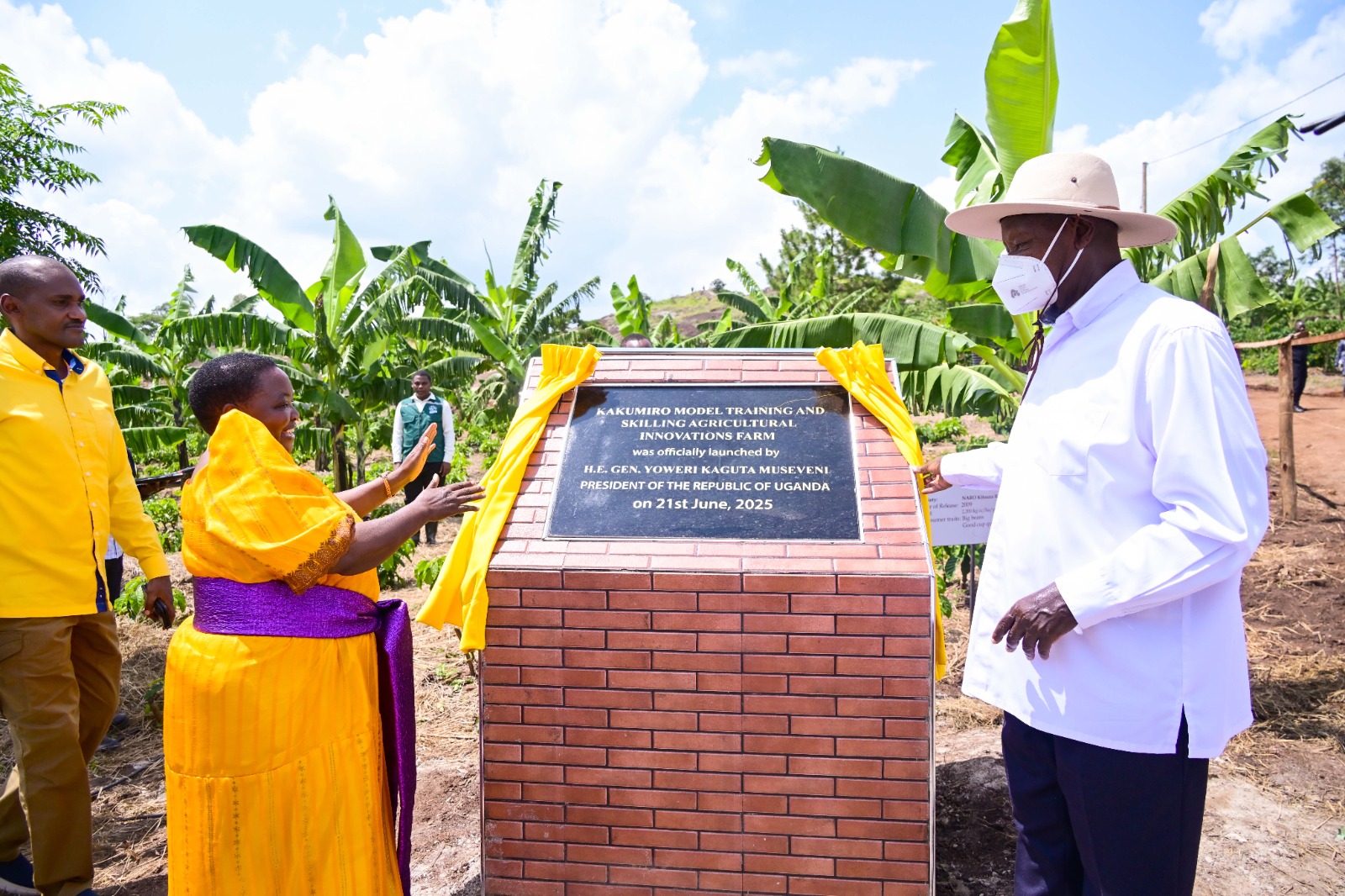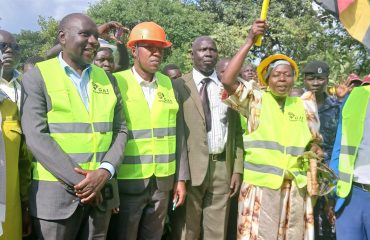On Saturday, President Yoweri Kaguta Museveni visited and officially inaugurated the Prime Minister, Rt. Hon. Robinah Nabbanja’s model and skilling farm located in Kakumiro District.
This farm has been established with technical support from the National Agricultural Research Organisation (NARO) to exemplify the effectiveness of the 4-Acre Model, an agricultural strategy endorsed by the President. The model aims to assist smallholder farmers in maximizing productivity on limited land by integrating food crops, cash crops, livestock, and poultry.
The farm serves as a practical illustration of how the 4-Acre Model can transform rural livelihoods, enhance household incomes, and improve food security. It integrates a range of high-value enterprises, such as onions, bananas, poultry, vegetables, pasture, dairy cows, pig farming, and coffee.
Notably, it also features a mother garden dedicated to improved KR coffee varieties developed by NARO, acting as both a training center and a source of high-quality planting materials for nearby communities.
In her remarks, the Prime Minister commended NARO for its technical guidance and innovative efforts in establishing the farm. She talked about the importance of practical demonstrations in inspiring communities and validating government-led agricultural models, stating,
“This farm demonstrates that, with the appropriate support, every Ugandan can derive benefits from agriculture. I extend my gratitude to NARO for accompanying me on this journey and for helping to turn this vision into reality. It is a commendable example of leadership by example.”
Dr. Yona Baguma, the Director General of NARO, highlighted the importance of science-led agriculture and the need for the scaled-up implementation of proven agricultural models. He remarked,
“NARO has developed improved, high-yielding, resilient coffee varieties, specifically KR1 to KR10, and has also established technology for the rapid multiplication of these varieties to ensure accessibility for farmers. The mother garden established at this site is among over 700 such gardens across the country and has been assessed as second only to that at the National Coffee Research Institute (NaCORI). Through this technology, NARO is fulfilling the government’s commitment to providing quality planting materials for farmers and increasing productivity at the farm level.”
In addition to coffee, Dr. Baguma emphasized NARO’s contributions to developing improved banana varieties, which are capable of yielding harvestable bunches within just one year if managed appropriately.
He noted that the banana plantation at the farm, established in August of the previous year, is already over 80% in the fruiting stage, demonstrating NARO’s commitment to enhancing resilient food security through the promotion of fast-growing and fast-maturing varieties.
Furthermore, NARO has implemented intensive dairy management systems aimed at increasing productivity. Recognizing that many farmers may not have the financial means to invest in high-cost facilities, NARO has demonstrated alternatives using locally sourced, low-cost materials that can achieve comparable results.
This model farm represents a robust response to the President’s call for practical demonstrations of the 4-Acre Model to ensure both food and economic security. According to assessments, this model is indeed one worth replicating throughout the nation.
Dr. Baguma noted that while the 4-Acre Model exhibits transformational potential, NARO is concurrently developing tailored 1-Acre and 2-Acre models to address land scarcity challenges in regions such as Kabale and the Mt. Elgon sub-region.
“These models will further empower farmers to escape the cycle of poverty. We therefore urge the government and His Excellency the President to support NARO in rapidly implementing these models nationwide, aligning them with the Parish Development Model (PDM) and other government initiatives. These models also create platforms for engaging and recruiting youth and women into the economy,” he stated.
Dr. Baguma further emphasized the significant transformation of the farm: “When we initiated the design of this model farm in August of the previous year, the site was characterized by rocky and seemingly unproductive land. Today, it stands as a vibrant example of how science-led agriculture can convert challenges into opportunities.”
Dr. Swidiq Mugerwa, NARO’s Deputy Director General in charge of Research Coordination, informed the President that the farm currently produces 150 liters of milk daily, with each liter sold at UGX 1,500. Additionally, the farm collects 266 trays of eggs each day, with each tray priced at UGX 10,000. He highlighted the essential role the farm plays in supplying coffee seedlings throughout the region, noting that it has the capacity to produce over 400,000 coffee seedlings annually.
Dr. Mugerwa emphasised that this model exemplifies how small farms can achieve economic viability and productivity, thereby serving as a foundation for community transformation.
Meanwhile, the Minister for Agriculture, Animal Industry, and Fisheries, Hon. Frank Tumwebaze, praised the government for its ongoing support of agricultural research and expressed appreciation for NARO’s efforts in advancing this initiative.




